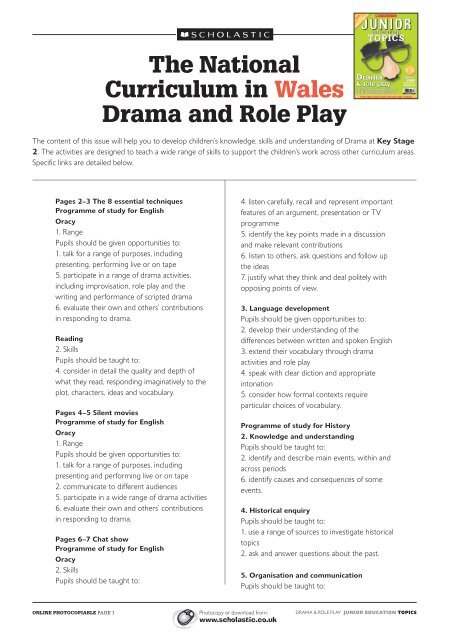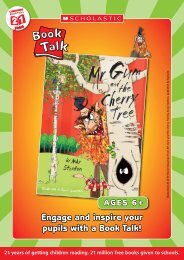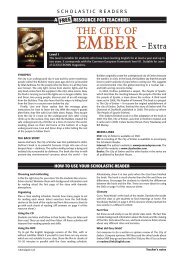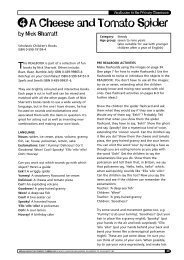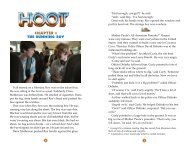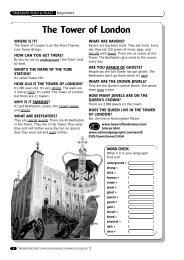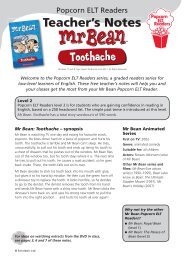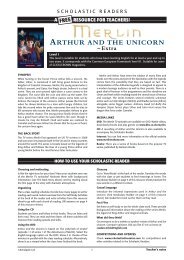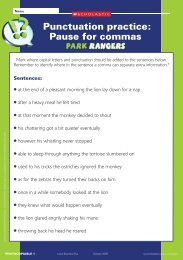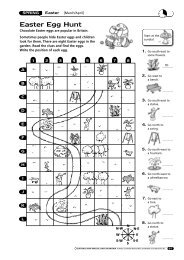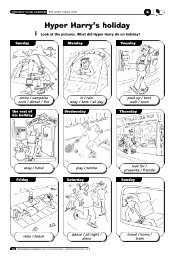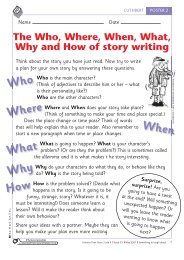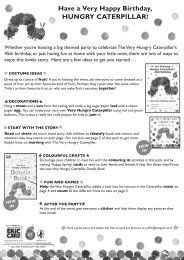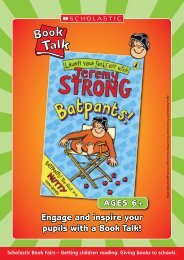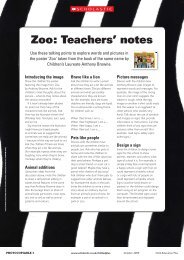The National Curriculum in Wales Drama and Role Play - Scholastic
The National Curriculum in Wales Drama and Role Play - Scholastic
The National Curriculum in Wales Drama and Role Play - Scholastic
Create successful ePaper yourself
Turn your PDF publications into a flip-book with our unique Google optimized e-Paper software.
<strong>The</strong> <strong>National</strong><br />
<strong>Curriculum</strong> <strong>in</strong> <strong>Wales</strong><br />
<strong>Drama</strong> <strong>and</strong> <strong>Role</strong> <strong>Play</strong><br />
<strong>The</strong> content of this issue will help you to develop children’s knowledge, skills <strong>and</strong> underst<strong>and</strong><strong>in</strong>g of <strong>Drama</strong> at Key Stage<br />
2. <strong>The</strong> activities are designed to teach a wide range of skills to support the children’s work across other curriculum areas.<br />
Specifi c l<strong>in</strong>ks are detailed below.<br />
Pages 2–3 <strong>The</strong> 8 essential techniques<br />
Programme of study for English<br />
Oracy<br />
1. Range<br />
Pupils should be given opportunities to:<br />
1. talk for a range of purposes, <strong>in</strong>clud<strong>in</strong>g<br />
present<strong>in</strong>g, perform<strong>in</strong>g live or on tape<br />
5. participate <strong>in</strong> a range of drama activities,<br />
<strong>in</strong>clud<strong>in</strong>g improvisation, role play <strong>and</strong> the<br />
writ<strong>in</strong>g <strong>and</strong> performance of scripted drama<br />
6. evaluate their own <strong>and</strong> others’ contributions<br />
<strong>in</strong> respond<strong>in</strong>g to drama.<br />
Read<strong>in</strong>g<br />
2. Skills<br />
Pupils should be taught to:<br />
4. consider <strong>in</strong> detail the quality <strong>and</strong> depth of<br />
what they read, respond<strong>in</strong>g imag<strong>in</strong>atively to the<br />
plot, characters, ideas <strong>and</strong> vocabulary.<br />
Pages 4–5 Silent movies<br />
Programme of study for English<br />
Oracy<br />
1. Range<br />
Pupils should be given opportunities to:<br />
1. talk for a range of purposes, <strong>in</strong>clud<strong>in</strong>g<br />
present<strong>in</strong>g <strong>and</strong> perform<strong>in</strong>g live or on tape<br />
2. communicate to different audiences<br />
5. participate <strong>in</strong> a wide range of drama activities<br />
6. evaluate their own <strong>and</strong> others’ contributions<br />
<strong>in</strong> respond<strong>in</strong>g to drama.<br />
Pages 6–7 Chat show<br />
Programme of study for English<br />
Oracy<br />
2. Skills<br />
Pupils should be taught to:<br />
4. listen carefully, recall <strong>and</strong> represent important<br />
features of an argument, presentation or TV<br />
programme<br />
5. identify the key po<strong>in</strong>ts made <strong>in</strong> a discussion<br />
<strong>and</strong> make relevant contributions<br />
6. listen to others, ask questions <strong>and</strong> follow up<br />
the ideas<br />
7. justify what they th<strong>in</strong>k <strong>and</strong> deal politely with<br />
oppos<strong>in</strong>g po<strong>in</strong>ts of view.<br />
3. Language development<br />
Pupils should be given opportunities to:<br />
2. develop their underst<strong>and</strong><strong>in</strong>g of the<br />
differences between written <strong>and</strong> spoken English<br />
3. extend their vocabulary through drama<br />
activities <strong>and</strong> role play<br />
4. speak with clear diction <strong>and</strong> appropriate<br />
<strong>in</strong>tonation<br />
5. consider how formal contexts require<br />
particular choices of vocabulary.<br />
Programme of study for History<br />
2. Knowledge <strong>and</strong> underst<strong>and</strong><strong>in</strong>g<br />
Pupils should be taught to:<br />
2. identify <strong>and</strong> describe ma<strong>in</strong> events, with<strong>in</strong> <strong>and</strong><br />
across periods<br />
6. identify causes <strong>and</strong> consequences of some<br />
events.<br />
4. Historical enquiry<br />
Pupils should be taught to:<br />
1. use a range of sources to <strong>in</strong>vestigate historical<br />
topics<br />
2. ask <strong>and</strong> answer questions about the past.<br />
5. Organisation <strong>and</strong> communication<br />
Pupils should be taught to:<br />
ONLINE PHOTOCOPIABLE PAGE 1<br />
Photocopy or download from:<br />
DRAMA & ROLE PLAY JUNIOR EDUCATION TOPICS
<strong>The</strong> <strong>National</strong><br />
<strong>Curriculum</strong> <strong>in</strong> <strong>Wales</strong> <strong>Drama</strong> <strong>and</strong><br />
<strong>Role</strong> <strong>Play</strong> (cont<strong>in</strong>ued)<br />
3. present results <strong>in</strong> a variety of ways, <strong>in</strong>clud<strong>in</strong>g<br />
oral presentations.<br />
growth, nutrition <strong>and</strong> reproduction, that are<br />
common to plants.<br />
Pages 9–11 <strong>Play</strong> time<br />
Programme of study for English<br />
Writ<strong>in</strong>g<br />
1. Range<br />
Pupils should be given opportunities to:<br />
3. write <strong>in</strong> response to a wide range of stimuli,<br />
<strong>in</strong>clud<strong>in</strong>g plays <strong>and</strong> stories<br />
4. use the characteristics of different k<strong>in</strong>ds of<br />
writ<strong>in</strong>g<br />
5. write <strong>in</strong> forms which <strong>in</strong>clude imag<strong>in</strong>ative<br />
writ<strong>in</strong>g, eg drama scripts.<br />
2. Skills<br />
Pupils should be taught to:<br />
4. develop their ability to organise <strong>and</strong><br />
structure their writ<strong>in</strong>g <strong>in</strong> a variety of ways us<strong>in</strong>g<br />
their experience of fi ction eg a story with a<br />
beg<strong>in</strong>n<strong>in</strong>g, middle <strong>and</strong> end.<br />
3. Language development<br />
Pupils should be given opportunities to:<br />
1. refl ect on their use of language, beg<strong>in</strong>n<strong>in</strong>g to<br />
differentiate between spoken <strong>and</strong> written forms.<br />
Page 12–13 L<strong>and</strong> of the giants<br />
Programme of study for Science<br />
Scientific enquiry<br />
2. Communication <strong>in</strong> science<br />
Pupils should be taught to:<br />
5. search for <strong>and</strong> access relevant scientifi c<br />
<strong>in</strong>formation, us<strong>in</strong>g ICT on some occasions.<br />
Life processes <strong>and</strong> liv<strong>in</strong>g th<strong>in</strong>gs<br />
1. Life processes<br />
Pupils should be taught:<br />
1. that there are life processes, <strong>in</strong>clud<strong>in</strong>g<br />
nutrition, movement, growth <strong>and</strong> reproduction<br />
common to animals, <strong>in</strong>clud<strong>in</strong>g humans<br />
2. that there are life processes, <strong>in</strong>clud<strong>in</strong>g<br />
3. Green plants as organisms<br />
Pupils should be taught:<br />
1. to <strong>in</strong>vestigate the effect on growth<br />
of chang<strong>in</strong>g conditions eg light, water,<br />
temperature, nutrients<br />
2. that plants need light to produce food for<br />
growth<br />
4. the ma<strong>in</strong> stages <strong>in</strong> the life cycle of fl ower<strong>in</strong>g<br />
plants.<br />
4. Liv<strong>in</strong>g th<strong>in</strong>gs <strong>in</strong> their environment<br />
Pupils should be taught:<br />
1. to fi nd out about the variety of plants found<br />
<strong>in</strong> different habitats<br />
2. how plants <strong>in</strong> two different habitats are<br />
suited to their environment<br />
3. that food cha<strong>in</strong>s show feed<strong>in</strong>g relationships<br />
4. that nearly all food cha<strong>in</strong>s start with a green<br />
plant.<br />
Pages 14–15 A village <strong>in</strong> India<br />
Programme of study for English<br />
Oracy<br />
1. Range<br />
Pupils should be taught to:<br />
5. participate <strong>in</strong> a range of drama activities,<br />
<strong>in</strong>clud<strong>in</strong>g improvisation, role play <strong>and</strong> the<br />
writ<strong>in</strong>g <strong>and</strong> performance of scripted drama.<br />
Read<strong>in</strong>g<br />
1. Range<br />
Pupils should be given opportunities to:<br />
5. read texts with challeng<strong>in</strong>g subject matter<br />
that broadens perspectives <strong>and</strong> extends<br />
th<strong>in</strong>k<strong>in</strong>g.<br />
Programme of study for Geography<br />
1. Geographical enquiry <strong>and</strong> skills<br />
Pupils should be taught to:<br />
ONLINE PHOTOCOPIABLE PAGE 2<br />
Photocopy or download from:<br />
DRAMA & ROLE PLAY JUNIOR EDUCATION TOPICS
<strong>The</strong> <strong>National</strong><br />
<strong>Curriculum</strong> <strong>in</strong> <strong>Wales</strong> <strong>Drama</strong> <strong>and</strong><br />
<strong>Role</strong> <strong>Play</strong> (cont<strong>in</strong>ued)<br />
8. identify <strong>and</strong> locate the places they are<br />
study<strong>in</strong>g<br />
• study two contrast<strong>in</strong>g localities <strong>in</strong>clud<strong>in</strong>g<br />
one <strong>in</strong> <strong>Wales</strong> or Europe <strong>and</strong> one <strong>in</strong> a less<br />
economically developed country.<br />
2. Places<br />
Pupils should be taught:<br />
3. why the locality is like this <strong>and</strong> what<br />
processes are contribut<strong>in</strong>g to its development<br />
5. why people’s views differ about how the<br />
locality is chang<strong>in</strong>g.<br />
3. <strong>The</strong>me<br />
Pupils should be taught to:<br />
1. identify ways <strong>in</strong> which people affect the<br />
environment<br />
2. <strong>in</strong>vestigate ways <strong>in</strong> which people attempt to<br />
look after the present <strong>and</strong> safeguard the future<br />
environment<br />
3. recognise that people have different views<br />
about changes made to the environment.<br />
Page 16 Po<strong>in</strong>ts of view<br />
Programme of study for English<br />
Oracy<br />
1. Range<br />
Pupils should be taught to:<br />
5. participate <strong>in</strong> a range of drama activities,<br />
<strong>in</strong>clud<strong>in</strong>g improvisation, role play <strong>and</strong> the<br />
writ<strong>in</strong>g <strong>and</strong> performance of scripted drama.<br />
Read<strong>in</strong>g<br />
2. Skills<br />
Pupils should be taught to:<br />
4. consider <strong>in</strong> detail the quality <strong>and</strong><br />
depth of what they read, respond<strong>in</strong>g<br />
imag<strong>in</strong>atively to the plot, characters, ideas <strong>and</strong><br />
vocabulary.<br />
3. Language development<br />
Pupils should be taught to:<br />
1. recognise the organisational, structural <strong>and</strong><br />
presentational features of different types of text.<br />
Writ<strong>in</strong>g<br />
1. Range<br />
Pupils should be given opportunities to:<br />
3. write <strong>in</strong> response to a wide range of stimuli,<br />
<strong>in</strong>clud<strong>in</strong>g plays <strong>and</strong> stories<br />
5. use the characteristics of different k<strong>in</strong>ds of<br />
writ<strong>in</strong>g, eg narrative, dialogue, persuasion<br />
6. write <strong>in</strong> forms which <strong>in</strong>clude imag<strong>in</strong>ative<br />
writ<strong>in</strong>g, eg drama scripts.<br />
2. Skills<br />
Pupils should be taught to:<br />
4. develop their ability to organise <strong>and</strong><br />
structure their writ<strong>in</strong>g <strong>in</strong> a variety of ways us<strong>in</strong>g<br />
their experience of fi ction eg a story with a<br />
beg<strong>in</strong>n<strong>in</strong>g, middle <strong>and</strong> end.<br />
3. Language development<br />
Pupils should be given opportunities to:<br />
1. refl ect on their use of language, beg<strong>in</strong>n<strong>in</strong>g to<br />
differentiate between spoken <strong>and</strong> written forms.<br />
ONLINE PHOTOCOPIABLE PAGE 3<br />
Photocopy or download from:<br />
DRAMA & ROLE PLAY JUNIOR EDUCATION TOPICS


